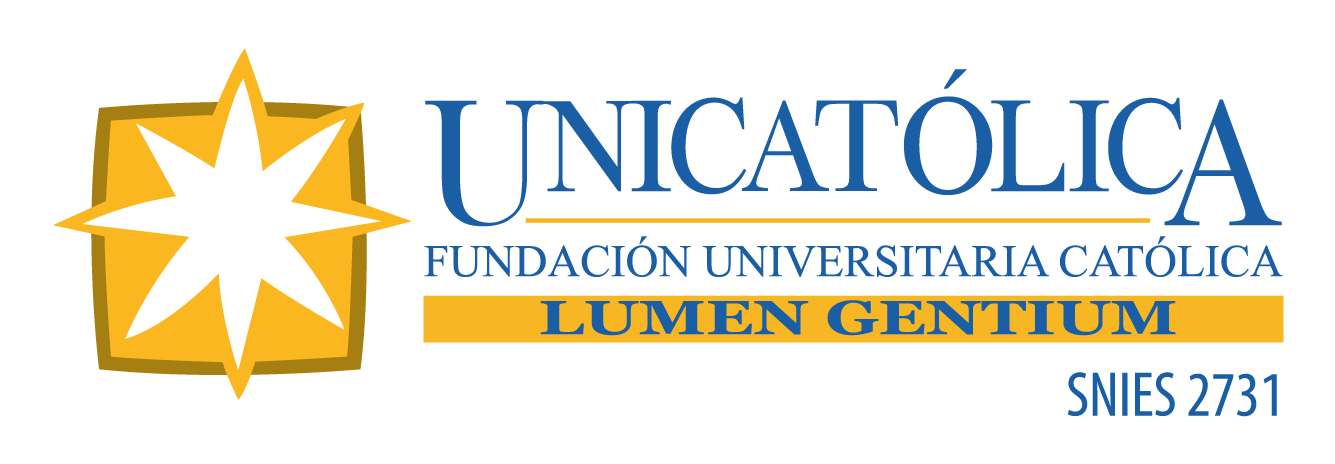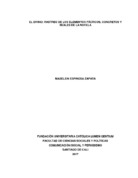Mostrar el registro sencillo del ítem
El divino: Rastreo de los elementos fácticos, concretos y reales de la novela
| dc.contributor.advisor | Aguirre, Alejandro | |
| dc.creator | Espinosa Zapata, Madelein | |
| dc.date.accessioned | 2018-05-18T16:43:33Z | |
| dc.date.available | 2018-05-18T16:43:33Z | |
| dc.date.created | 2017 | |
| dc.identifier.uri | http://hdl.handle.net/20.500.12237/924 | |
| dc.description | Investigar los elementos fácticos, concretos y reales de la novela ‘El Divino’ del escritor Gustavo Álvarez Gardeazábal resulta fascinante cuando la novela mencionada está basada en personajes reales, que habitan un corregimiento del norte del departamento del Valle del Cauca llamado Ricaurte. Establecer un paralelo entre la ficción de la novela y la realidad de sus personajes y su cultura, permite conocer si la novela ‘El Divino’ realmente inmortalizó el corregimiento de Ricaurte, y también permite comprender si la mayoría de los habitantes se reconocen e identifican con la novela. Teniendo en cuenta lo anterior, es indispensable precisar el objetivo general, que concretamente es realizar un desmonte documental de la novela ‘El Divino’ del escritor Gustavo Álvarez Gardeazábal, para el entendimiento de la ficción y la realidad, a partir del rastreo de los elementos fácticos, concretos y reales. Para lograr el objetivo general planteado, se realizará la investigación con una metodología concreta dividida en tres fases. La primera fase contempla el reconocimiento, la documentación e integración por parte de los habitantes del corregimiento de Ricaurte donde con una muestra de 100 personas pertenecientes a la comunidad, se realizarán lecturas colectivas del capítulo 11, 60 y 72 de la novela. Las personas que asistan a las lecturas colectivas establecerán un paralelo entre la realidad de sus vidas en el corregimiento y la ficción que plantea la novela, participando así de manera directa en el inicio del desarrollo de la investigación y manifestando si se reconocen e identifican su cultura por el contenido de la novela. De igual forma, la segunda fase tiene como prioridad documentar la voz de la fuente principal que, en este caso, es el escritor de la novela ‘El Divino’, por lo cual, se le realizará una entrevista a Gustavo Álvarez Gardeazábal, contemplando también su punto de vista en cuanto a lo que el planteó en el contenido de la novela, e indagando además si la novela ‘El Divino’ hace parte de la tendencia del constumbrismo. Finalmente, la tercera fase comprende la realización de un escrito a manera de reportaje que consiste en un documento donde se plasma de manera concreta los resultados de toda la investigación, e incluye entrevistas y fotografías. Además de lo anterior, se realizará la postproducción de las piezas audiovisuales recopiladas en el proceso de entrevistas y reconocimiento en la comunidad, para concluir con la entrega del escrito y un producto audiovisual final. De todo el proceso planteado con anterioridad, se espera concretar y llevar a feliz término el cronograma sin ningún contratiempo, además compartir y exponer los resultados de la investigación y la pieza audiovisual con toda la comunidad, teniendo como único propósito, concretar si la novela "El Divino" inmortaliza la historia del corregimiento de Ricaurte y saber si los habitantes se pueden reconocer mediante la misma. | spa |
| dc.description.abstract | Investigate the factual, concrete and real elements of the novel 'El Divino' by the writer Gustavo Álvarez Gardeazábal is fascinating when the aforementioned novel is based on real characters, who inhabit a corregimiento of the northern department of Valle del Cauca called Ricaurte. Establishing a parallel between the fiction of the novel and the reality of its characters and culture, allows us to know if the novel 'El Divino' really immortalized the corregimiento of Ricaurte, and also allows us to understand if most of the inhabitants recognize and identify with the novel. Taking into account the above, it is essential to specify the general objective, which specifically is to make a documentary dismantling of the novel 'The Divine' by the writer Gustavo Álvarez Gardeazábal, for the understanding of fiction and reality, from the tracking of the elements factual, concrete and real. To achieve the general objective, the research will be carried out with a specific methodology divided into three phases. The first phase contemplates the recognition, documentation and integration by the inhabitants of the corregimiento of Ricaurte where, with a sample of 100 people belonging to the community, there will be collective readings of chapters 11, 60 and 72 of the novel. The people who attend the collective readings will establish a parallel between the reality of their lives in the corregimiento and the fiction that the novel proposes, thus participating directly in the beginning of the development of the investigation and manifesting if they recognize and identify their culture for the content of the novel. Similarly, the second phase has as a priority to document the voice of the main source, in this case, is the writer of the novel 'El Divino', for which, an interview will be made to Gustavo Álvarez Gardeazábal, also contemplating his point of view regarding what he raised in the content of the novel, and also inquiring whether the novel 'The Divine' is part of the trend of constumbrismo. Finally, the third phase involves the production of a written report that consists of a document where the results of the entire investigation are concretely captured, and include interviews and photographs. In addition to the above, post-production of the audiovisual pieces compiled in the process of interviews and recognition in the community will be carried out, to conclude with the delivery of the writing and a final audiovisual product. From all the process outlined above, it is expected to finalize and bring to a successful conclusion the schedule without any setbacks, in addition to share and expose the results of the research and the audiovisual piece with the whole community, with the sole purpose of specifying whether the novel " The Divine "immortalizes the history of the corregimiento of Ricaurte and know if the inhabitants can be recognized by it. | eng |
| dc.source | instname:Fundación Universitaria Católica Lumen Gentium | |
| dc.source | reponame:Repositorio Fundación Universitaria Católica Lumen Gentium | |
| dc.subject | Novela de ciencia ficción | spa |
| dc.subject | Personajes y Cultura | spa |
| dc.title | El divino: Rastreo de los elementos fácticos, concretos y reales de la novela | spa |
| dc.type | info:eu-repo/semantics/bachelorThesis | |
| dc.subject.subjectenglish | Science fiction novel | eng |
| dc.subject.subjectenglish | Characters and Culture | eng |
| dc.rights.accessRights | info:eu-repo/semantics/openAccess | |
| dc.creator.degree | Comunicador Social - Periodista | |
| dc.publisher.program | Comunicación Social y Periodismo | |
| dc.type.spa | Trabajo de grado | |
| dc.type.hasVersion | info:eu-repo/semantics/acceptedVersion | |
| dc.publisher.department | Facultad de Ciencias Sociales y Políticas |

